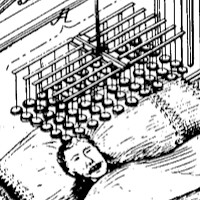The 15th-1/2 President (February 18, 1861)

“The powers not delegated to the United States by the Constitution, nor prohibited by it to the states, are reserved to the states respectively, or to the people.” –Amendment X, 1791
Immediately following the American Revolution, the leaders of the 13 colonies got together and drew up a document called the Articles of Confederation which empowered the colonies, or states, and established a weak centralized government. When problems arose, however, those that desired a stronger centralized government blamed their current system. The Continental Congress convened in secret and drew up the US Constitution. The new document gave more power to the Federal government, but took away some power from the States. The idea of nullification—that the States could chose to declare certain Federal acts null and void—was shot down and the first murmurs of secession began.
In November of 1860, Abraham Lincoln became President of the United States, winning 40% of the popular vote, 59% of the Electoral votes, and not even appearing on the ballots in the deep South. In December of that same year, South Carolina officially seceded from the Union. Many more states would follow.
In February of 1861, the Provisional Constitution of the Confederacy became effective in Alabama and elected, unanimously, Jefferson Davis as President of the Confederacy. He was inaugurated on February 18, 1861, a mere week after President Lincoln left Springfield, IL for Washington, D.C.
Jefferson Davis, a States’ Rights proponent, served as a Senator for Mississippi from 1847 to 1851, when he retired from the Senate to run for Governor of Mississippi. He successfully lost the election. He did, however, support Pierce in his run for Presidency. Once Pierce had been elected, Davis returned to serve on the cabinet, specifically dealing with war and battle tactics. At the close or Pierce’s term, Davis left the cabinet and returned to the Senate. One of the ideas Davis opposed was that of “popular sovereignty”—the right of the territories to determine if they would enter the Union as a free or slave state—which brought him into debates with Stephen A. Douglas quite frequently.
He became the favoured Democratic candidate in the 1860 election, however, he turned down all the nominations. In January of 1861, his state, Mississippi, seceded from the Union. Upon hearing of the situation, Davis withdrew from the Senate to return home, giving a final speech in support of the South and apologizing to anyone he’d ever offended.
Before he returned to Mississippi, however, the Provisional Congress of the Confederacy had appointed and unanimously elected him President of the Confederacy, inaugurating him on the 18th of February, 1861. In November, he was elected President of the Confederacy, unopposed. February 18, 1862, the first congress under the permanent Constitution of the Confederacy convened in Richmond, VA, and President Davis was inaugurated on the 22nd of February, 1862.
As an interesting train of thought into the hypothetical—what would the United States be like today if Jefferson Davis had, indeed, not turned down the nominations for Presidency in 1860? What if, instead of being the “15th ½ President” of the United States, Jefferson Davis had been the 16th President? The world will never know, but theories are always welcomed.
Immediately following the American Revolution, the leaders of the 13 colonies got together and drew up a document called the Articles of Confederation which empowered the colonies, or states, and established a weak centralized government. When problems arose, however, those that desired a stronger centralized government blamed their current system. The Continental Congress convened in secret and drew up the US Constitution. The new document gave more power to the Federal government, but took away some power from the States. The idea of nullification—that the States could chose to declare certain Federal acts null and void—was shot down and the first murmurs of secession began.
In November of 1860, Abraham Lincoln became President of the United States, winning 40% of the popular vote, 59% of the Electoral votes, and not even appearing on the ballots in the deep South. In December of that same year, South Carolina officially seceded from the Union. Many more states would follow.
In February of 1861, the Provisional Constitution of the Confederacy became effective in Alabama and elected, unanimously, Jefferson Davis as President of the Confederacy. He was inaugurated on February 18, 1861, a mere week after President Lincoln left Springfield, IL for Washington, D.C.
Jefferson Davis, a States’ Rights proponent, served as a Senator for Mississippi from 1847 to 1851, when he retired from the Senate to run for Governor of Mississippi. He successfully lost the election. He did, however, support Pierce in his run for Presidency. Once Pierce had been elected, Davis returned to serve on the cabinet, specifically dealing with war and battle tactics. At the close or Pierce’s term, Davis left the cabinet and returned to the Senate. One of the ideas Davis opposed was that of “popular sovereignty”—the right of the territories to determine if they would enter the Union as a free or slave state—which brought him into debates with Stephen A. Douglas quite frequently.
He became the favoured Democratic candidate in the 1860 election, however, he turned down all the nominations. In January of 1861, his state, Mississippi, seceded from the Union. Upon hearing of the situation, Davis withdrew from the Senate to return home, giving a final speech in support of the South and apologizing to anyone he’d ever offended.
Before he returned to Mississippi, however, the Provisional Congress of the Confederacy had appointed and unanimously elected him President of the Confederacy, inaugurating him on the 18th of February, 1861. In November, he was elected President of the Confederacy, unopposed. February 18, 1862, the first congress under the permanent Constitution of the Confederacy convened in Richmond, VA, and President Davis was inaugurated on the 22nd of February, 1862.
As an interesting train of thought into the hypothetical—what would the United States be like today if Jefferson Davis had, indeed, not turned down the nominations for Presidency in 1860? What if, instead of being the “15th ½ President” of the United States, Jefferson Davis had been the 16th President? The world will never know, but theories are always welcomed.
| Today in History Forum Posts |
| How will you ring in the new year? |
| Favorite John Lennon lyric? |
| More fun November holidays |

Related Articles
Editor's Picks Articles
Top Ten Articles
Previous Features
Site Map
Content copyright © 2023 by Christa Mackey. All rights reserved.
This content was written by Christa Mackey. If you wish to use this content in any manner, you need written permission. Contact Lane Graciano for details.







